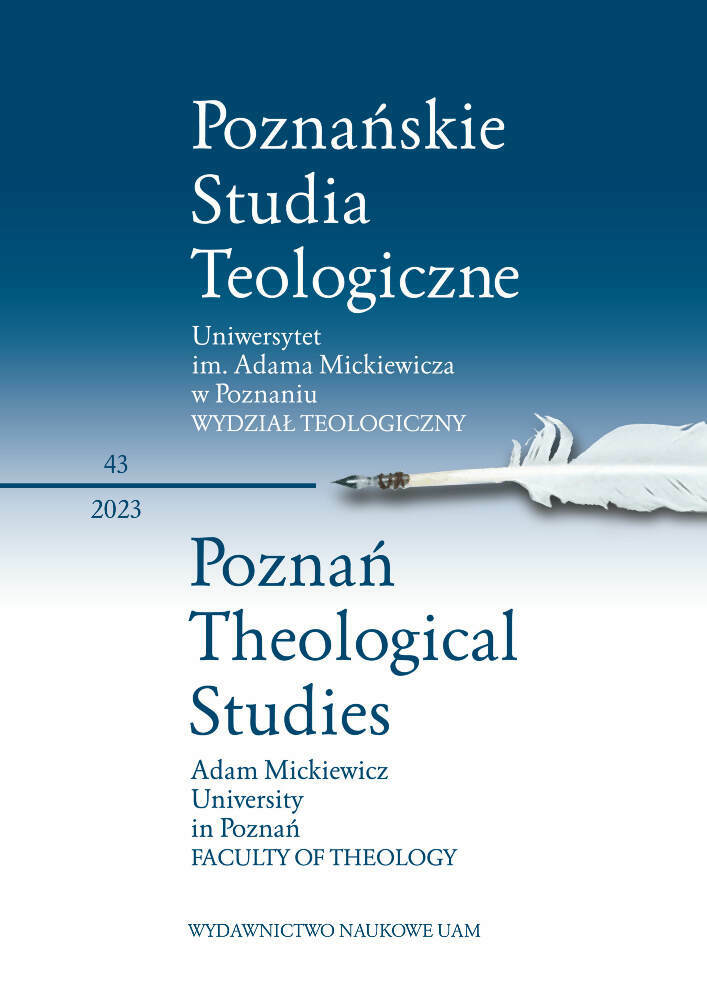Abstract
In accordance with the pre-partition tradition in which the Sejms of the Republic of Poland were inaugurated with the Holy Mass and a sermon delivered in church, the Polish District Sejm in Poznań in 1918 was also commenced in the same manner. The Holy Mass was celebrated by Cardinal Edmund Dalbor, the Primate of Poland, on December 3rd in the Basilica of Our Lady of Perpetual Help, Mary Magdalene and St Stanislaus (Poznań Parish Church) and a sermon was delivered by its parish priest, Rev. Antoni Stychel, an outstanding priest and a national and social activist. The text of the sermon, consisting of 9 pages in the 2018 edition, has a fairly clear structure. It is divided into three parts. The first part is essentially devoted to a reflection on the causes of Poland’s loss of independence and to expressing the joy of the forthcoming liberation. The second longest part aims, on the one hand, to show everyone that Poles, through their suffering, earned with God the resurrection of their homeland, and on the other hand, to enhearten Poles in this joyful historic moment stating that this is thanks to their prolonged anguish and steadfast perseverance that they are worthy of deliverance. The last third part is devoted to offering thanksgiving to God for putting an end to the centuries-old bondage, which is tied with a call to work on oneself and work for the common good so that the nation could deserve the durability of freedom and the gift of the successful development of the motherland. The sermon ends with a prayer to God and a specific “litany of the nation” to the most important Polish saints who are to plead with God to shower Poles with His grace. The sermon delivered by Rev. Antoni Stychel inscribes itself into the great and long tradition of Polish patriotic preaching. It is based primarily on the most outstanding Sejm sermons of great Polish preachers such as Hieronim Powodowski or Piotr Skarga. Like them, Rev. Antoni Stychel makes the Polish District Sejm delegates aware of how much moral obligation rests on them towards those who fought, suffered and gave their lives for a free and just country. He appeals to their consciences and hearts to be guided only by the common good when holding sessions and adopting resolutions. The preacher calls on them and all Poles to uproot national flaws, to form virtues and, above all, not to waste the gift of returning independence.
References
Adamek Z., Homiletyka, Tarnów 1992.
Chamot M., Chrześcijański ruch robotniczy w zaborze pruskim w latach 1890–1914, „Czasy Nowożytne” 3 (1997), s. 49-61.
Chrzanowski I., Kazania sejmowe P. Skargi, Warszawa 1912.
Dziennik Polskiego Sejmu Dzielnicowego w Poznaniu w grudniu 1918 r., wyd. A. Gulczyński, Poznań 2018.
Jan Paweł II, Pamięć i tożsamość, Kraków 2005.
Korolko M., Powodowski Hieronim [w:] Polski słownik biograficzny, t. 28, red. E. Rostworowski, Wrocław-Warszawa-Kraków-Gdańsk-Łódź 1984-1985, s. 282-285.
Lewek A., Współczesna odnowa kaznodziejstwa, z. 2: Zarys homiletyki ogólnej, Warszawa 1980.
Panuś K., Sztuka głoszenia kazań, Kraków 2008.
Panuś K., Zarys historii kaznodziejstwa w Kościele katolickim, cz. 2: Kaznodziejstwo w Polsce, t. 1: Od średniowiecza do baroku, Kraków 2001.
Panuś K., Zarys historii kaznodziejstwa w Kościele katolickim, cz. 2: Kaznodziejstwo w Polsce, t. 2: Od Oświecenia do XX wieku, Kraków 2001.
Pietrzak J., Antoni Stychel [w:] Wielkopolski słownik biograficzny, Warszawa–Poznań 1981, s. 710-711.
Pietrzak J., Antoni Stychel (1859-1935) [w:] Wielkopolanie XX wieku, red. A. Gulczyński, Poznań 2001, s. 525-533.
Reichstags-Handbuch 12. Legislaturperiode, Berlin 1907.
Reichstags-Handbuch 13. Legislaturperiode, Berlin 1912.
Skarga P., Kazania sejmowe, Wrocław 1984.
Słomiński K., Stanisław Sokołowski. Studyum do dziejów kaznodziejstwa XVI wieku, „Przegląd Powszechny” 9 (1892), t. 34, s. 305-323.
Stychel A., Kazanie sejmowe, „Przegląd Wielkopolski” 3 (2018), s. 24-30.
Taisner R., Katolickie Towarzystwo Robotników Polskich w Poznaniu „przy Farze” w latach 1893-1904 pod patronatem ks. Antoniego Stychla, „Ecclesia. Studia z Dziejów Wielkopolski” 5 (2010), s. 99-136. DOI: https://doi.org/10.14746/e.2010.5.6
Walczak B., Księdza prałata Antoniego Stychla kazanie „sejmowe” – komentarz językowy, „Przegląd Wielkopolski” 3 (2018), s. 30-36.
License
Copyright (c) 2023 Adam Kalbarczyk

This work is licensed under a Creative Commons Attribution-NonCommercial-NoDerivatives 4.0 International License.

